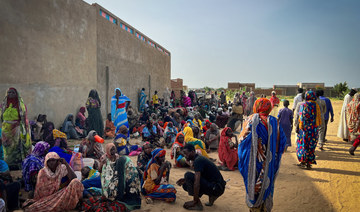JUBA: As the conflict in Sudan’s Darfur region escalates, the UN has urged immediate action to prevent a potential genocide, but experts say that intervention has been hampered by the ongoing fighting, donor fatigue and attention on other humanitarian crises around the world.
According to recent reports, Arab militias, supported by paramilitary forces, have allegedly attacked civilians fleeing El-Geneina, the capital of West Darfur state, near the border with Chad.
The situation has reached a critical point, with the UN’s human rights office declaring El-Geneina “uninhabitable” and infrastructure severely damaged. Volker Turk, the UN high commissioner for human rights, has called on the leadership of the Rapid Support Forces, or RSF, to end the killings and stop vilifying people on the basis of ethnicity.
Bakheet Suliman Adam Abdallah, a human rights advocate hailing from Al-Fashir in Darfur and a member of the Tame tribe, which is predominantly Muslim, has disclosed distressing details about the ongoing conflict in the region.
In a telephone interview with Arab News recently, he said he witnessed widespread acts of murder and targeted violence executed by various militias. “Being black-skinned automatically designates you as one of the primary targets,” he stated.
Furthermore, Abdallah revealed that following the outbreak of war, community leaders in Al-Fashir endeavored to quell the internal clashes between the RSF and Sudan Armed Forces, or SAF, resulting in the division of the city into two zones.
Finding himself in the eastern part under RSF control, he said he was harassed and falsely accused of espionage on two separate occasions solely based on his skin color. “They held a gun to my head, detained me at the gate for two hours, looted all my money, and confiscated my phone.”
Abdallah said that as the violence escalated, and with RSF soldiers forcefully entering people’s homes, he felt he could not continue his human rights work. Consequently, he decided to flee through South Sudan and seek refuge in Uganda.
With citizens having no weapons to defend themselves, a growing number of desperate Sudanese youths have approached SAF bases in recent days to volunteer for combat.
William Carter, who is Sudan country director for the Norwegian Refugee Council, told Arab News recently that “the situation is very challenging.” His organization has been unable to deliver aid due to the ongoing fighting in the region. “Our organization had to suspend its work in Darfur, and some staff members have even become refugees in Chad,” he added.
While people like Abdallah have called for the UN to launch a peacekeeping mission, there is little chance of any external intervention.
“That’s not only because of the lack of political support but also among the parties involved,” Dr. Jair van der Lijn, a senior researcher and director of the Peace Operations and Conflict Management Programme at Stockholm International Peace Research Institute, or SIPRI, told Arab News recently.
“Right now, the appetite for large-scale peace operations among Security Council members is low, and finding troop-contributing countries would be challenging,” Van der Lijn added.
Previously, the world body’s peacekeeping force, UNAMID, or UN – African Union Hybrid Operation in Darfur, was deployed in 2007 to protect civilians and address the conflict, in which between 80,000 and 400,000 casualties were reported. The mission concluded on Dec. 31, 2020, after making progress in stabilizing the region.
However, there remains an urgent need for aid. “There is not enough humanitarian assistance at this point, also to the refugee camps,” Van der Lijn added. “Donor fatigue and competing humanitarian crises divert attention and resources away from Africa.”














